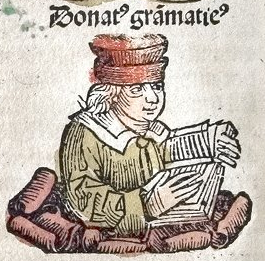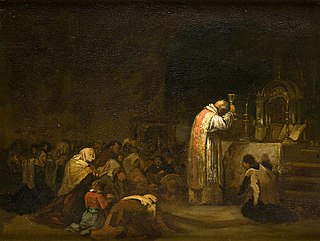Related Research Articles

The Compact Disc-Interactive is a digital optical disc data storage format that was mostly developed and marketed by Dutch company Philips. It was created as an extension of CDDA and CD-ROM and specified in the Green Book specifications, co-developed by Philips and Sony, to combine audio, text and graphics. The two companies initially expected to impact the education/training, point of sale, and home entertainment industries, but CD-i eventually became best known for its video games.
Strategic Simulations, Inc. (SSI) was a video game developer and publisher with over 100 titles to its credit from its founding in 1979 to its dissolution in 1994. The company was especially noted for its numerous wargames, its official computer game adaptations of Dungeons & Dragons, and for the groundbreaking Panzer General series.

A Pontifical High Mass, also called Solemn Pontifical Mass, is a Solemn or High Mass celebrated by a bishop using certain prescribed ceremonies. Although in modern English the word "pontifical" is almost exclusively associated with the pope, any bishop may be properly called a pontiff. Thus, the celebrant of a Pontifical High Mass may be the pope, any bishop or any other prelate who is allowed to wear pontificals.

Aelius Donatus was a Roman grammarian and teacher of rhetoric.

Luigi Colani was a German industrial designer.

Lenovo Group Limited, often shortened to Lenovo, is a Chinese multinational technology company specializing in designing, manufacturing, and marketing consumer electronics, personal computers, software, business solutions, and related services. Products manufactured by the company include desktop computers, laptops, tablet computers, smartphones, workstations, servers, supercomputers, data storage devices, IT management software, and smart televisions. Its best-known brands include its ThinkPad business line of laptop computers, the IdeaPad, Yoga, and Legion consumer lines of laptop computers, and the IdeaCentre and ThinkCentre lines of desktop computers. As of 2021, Lenovo is the world's largest personal computer vendor by unit sales.

In Christian liturgy, "the Pax" is an abbreviation of the Latin salutations "pax vobis" or "pax vobiscum", which are used in the Catholic Mass, the Lutheran Divine Service, and the Western Orthodox Mass.

Zeos International, Ltd., was a PC manufacturer based in Minneapolis, Minnesota. Originally based in New Brighton, Minnesota, and founded by Gregory E. Herrick, the company incorporated in Minnesota in 1981. Prior to manufacturing PCs, the company was called NPC Electronics. NPC was a contract assembly business best known for developing a transmitter device called Radio Realty. Marketed primarily to real estate brokers, this product enabled prospective home buyers to tune in and listen to prerecorded information about a property listing while parked in front of the dwelling. Radio Realty was divested in the early 1980s as NPC started developing, manufacturing, and selling PCs under the Zeos name. The company went public in mid-1985 by self-underwriting, and officially changed its name from NPC Electronics to Zeos International.
Dóminus vobíscum is an ancient salutation and blessing traditionally used by the clergy in the Masses of the Catholic Church and other liturgies, as well as liturgies of other Western Christian denominations, such as Lutheranism, Anglicanism and Methodism.

Ite, missa est are the concluding Latin words addressed to the people in the Mass of the Roman Rite in the Catholic Church, as well as in the Divine Service of the Lutheran Church.

Nissan Motors v. Nissan Computer was a lengthy court case between the two parties over use of the name Nissan and the domain name nissan.com. The case has received national attention in the U.S.

Pro multis is a Latin phrase that means "for many" or "for the many". Not having the definite article, Latin does not distinguish between these two meanings.
Johnson Outdoors Inc. produces outdoor recreational products such as watercraft, diving equipment, camping gear, and outdoor clothing. It has operations in 24 locations worldwide, employs 1,400 people and reports sales of more than $315 million. Helen Johnson-Leipold, one of Samuel Curtis Johnson, Jr.'s four children, has run the company since 1999.

Maxdata is the name of two German information technology companies.
Thomas Fabri was a composer from the Southern Netherlands (Flanders), who worked during the early 15th century.

MCV/Develop is a UK trade magazine that focuses on the business aspects of the video game industry. It is published monthly by Biz Media, a subsidiary of Datateam Media Group and is available in print and digitally. Originally named MCV, it absorbed the assets of sister magazines in 2018, and changed its name to MCV/Develop in 2019.
Pastores dabo vobis is an apostolic exhortation released on March 25, 1992, by Pope John Paul II. It concerns the formation of priests and is addressed to both clergy and the lay faithful of the Catholic Church.

Kingsoft GmbH was a German video game company based in Aachen. The company was founded in 1982 by Fritz Schäfer out of his parents' house in Mulartshütte (Roetgen) to sell his chess simulation game Boss, which he developed the year before. Kingsoft expanded into third-party publishing in 1983, starting with Galaxy by Henrik Wening. Most of their games were released for computers developed by Commodore International, predominantly the Commodore 64, Commodore 16 and later Amiga, and were usually based on other company's titles for different platforms. Kingsoft moved to Aachen in 1987 and established a distribution service before ceasing publishing in favour of distribution in 1993. The company was acquired in March 1995 by Electronic Arts, who retired the Kingsoft name later that year.

PalaTrussardi, later known as PalaVobis, PalaTucker, Mazda Palace and PalaSharp, was an indoor arena located in Milan, Italy. The seating capacity was 8,479 and it hosted concerts and sporting events. It was built in 1985 to replace two pre-existing structures, the Sport Palace and the Palatenda.
References
- ↑ "О бренде "Highscreen"".
- ↑ Archived at Ghostarchive and the Wayback Machine : VOBIS HIGHSCREEN COMPUTER 1994. YouTube .